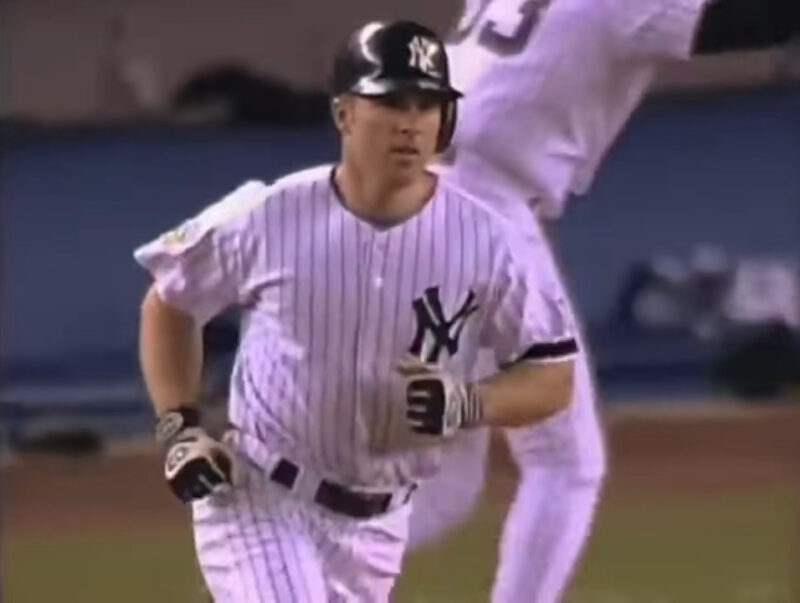Imagine a baseball game tied in the bottom of the last inning. The home team is up to bat, the crowd is buzzing with excitement, and the batter steps up to the plate.
Then, with a powerful swing, the ball soars out of the park. The home team wins, and the stadium erupts in cheers.
This thrilling moment is what fans call a “walk-off home run.” Let’s explore what makes this moment so special and memorable.
Key Takeaways
- A walk-off home run occurs when a player from the home team hits a home run in the bottom of the final inning, instantly ending the game with a win for the home team.
- This only happens when the home team is either tied with or trailing the opposing team, and it must occur in the final at-bat of the game.
- These moments have the power to change the outcome of a game or even a series, making them memorable and often iconic moments in baseball history.
- Notable walk-off home runs include Bill Mazeroski’s in the 1960 World Series, Joe Carter’s in the 1993 World Series, and Kirk Gibson’s in the 1988 World Series, each leaving a significant mark in baseball lore.
- Batters may adjust their approach based on the game situation, and pitchers might pitch more cautiously, adding a layer of tactical depth to these pivotal moments.
What Does It Mean?
A walk-off home run occurs when a player hits a home run in the bottom of the final inning, which gives his team the lead and, consequently, the win. It’s called “walk-off” because the teams walk off the field immediately after.
The term was coined by Hall of Fame pitcher Dennis Eckersley in the late 1980s, but the concept has been part of baseball lore for much longer. To understand these moments, you must grasp the basic rules of baseball.
A game consists of nine innings, and each inning is split into two halves. The visiting team bats in the top half, and the home team bats in the bottom half.
If the score is tied at the end of the ninth inning, the game goes into extra innings. A home run is a hit that allows the batter to circle all the bases and reach home plate, scoring a run for his team.
The Conditions

For a home run to be classified as a walk-off, several conditions must be met:
- Occur in the Home Team’s Final At-Bat: The home run must happen when the home team is batting in the bottom of the ninth or later innings. This timing adds to the drama, as it’s often the last opportunity for the home team to secure a win. The anticipation and tension that build up during these final at-bats are what make walk-offs so electrifying.
- Instant Win: The hit must immediately end the game by giving the home team the lead. This rule underscores the sudden and decisive nature of the walk-off home run, creating a stark contrast between the uncertainty before the hit and the immediate resolution after. The abrupt shift from suspense to celebration is a key element of its appeal.
- Score Tied or Trailing: The home team must either be tied or trailing in runs before the home run is hit. This condition ensures that the home run has a significant impact on the game’s outcome, highlighting the batter’s role as a clutch performer in a high-pressure situation.
The Impact
The impact of a walk-off home run is immense:
- It delivers an instant victory and a surge of excitement for the home team and its fans. This moment often leads to euphoric celebrations both on the field and in the stands, creating lifelong memories for everyone involved. The emotional high also reinforces the communal aspect of sports, uniting players and fans in a shared triumphant experience.
- It can turn the tide in a close game or a series, especially during the playoffs or World Series. This ability to alter the course of a game or series demonstrates the significant strategic value of a walk-off home run. It’s not just a win; it’s a momentum swinger that can redefine a team’s path to victory.
- These home runs often become iconic moments in baseball history. They are replayed and remembered for years, sometimes defining a player’s career or a franchise’s legacy. The stories of these moments are passed down through generations, cementing their place in the cultural fabric of the sport.
Famous Walk-Off Home Runs

Walk-off home runs have created some of the most memorable moments in baseball history. Here are a few notable examples:
Bill Mazeroski (1960 World Series)
Mazeroski’s walk-off in Game 7 gave the Pittsburgh Pirates the World Series victory over the New York Yankees. This home run is historic not only for its timing but also for being the first of its kind in World Series history, forever changing the expectations for dramatic finishes in baseball.
Joe Carter (1993 World Series)
Carter’s walk-off for the Toronto Blue Jays won them the World Series against the Philadelphia Phillies. This moment is etched in baseball lore, not just for its dramatic finish but also for being only the second time a World Series ended on a home run, echoing Mazeroski’s feat.
Kirk Gibson (1988 World Series)
Despite injuries, Gibson hit a walk-off for the Los Angeles Dodgers against the Oakland Athletics in Game 1, which is remembered as one of the most dramatic moments in sports history. Gibson’s unlikely heroics, battling through pain, added an element of human triumph to the lore of walk-offs.
Strategy Behind the Moment
While it seems like a moment of pure luck, there’s a strategy involved in a walk-off home run:
Batters often adjust their approach based on the game situation. They might focus on just making solid contact rather than swinging for the fences, understanding that a single well-placed hit can change everything. This strategic mindset showcases the mental aspect of baseball, where anticipation and adaptability are key.
Pitchers, aware of the stakes, might pitch more cautiously, leading to a tense matchup between pitcher and batter. This cat-and-mouse game adds a psychological layer to the confrontation, making the eventual outcome even more thrilling. The pitcher’s approach in these moments can be as crucial as the batter’s.
The defense also plays a critical role in these situations. Fielders are acutely aware that any mistake could be the game’s deciding factor. This pressure can lead to spectacular defensive plays or, conversely, costly errors, adding another layer of complexity to the walk-off scenario.
FAQs

Can a walk-off home run occur during a game that is not tied?
Yes, it can occur when the home team is trailing by any number of runs, as long as the home run results in the home team taking the lead and winning the game. For instance, if the home team is down by three runs and hits a grand slam (four runs), it would be a walk-off home run.
What happens if a walk-off home run is hit during a doubleheader’s first game?
The game ends immediately after the walk-off home run, regardless of whether it’s the first game in a doubleheader. The teams then prepare for the second game, following a short intermission.
Has there ever been a walk-off home run by a pitcher?
Yes, pitchers have hit walk-off home runs, though it’s rare due to pitchers generally being less skilled hitters. One notable example is Earl Wilson, a pitcher for the Detroit Tigers, who hit a walk-off home run in 1968.
Are walk-off home runs more common in certain ballparks?
Their frequency can vary by ballpark due to factors like the park’s size, altitude, and weather conditions. Smaller ballparks or those at higher altitudes, where the ball travels farther, might see more walk-off home runs.
What is the record for the most walk-off home runs by a player in a single season?
The record for the most walk-off home runs in a single season is held by Jim Thome, who hit four walk-off home runs for the Cleveland Indians in 2001.
Do walk-off home runs count toward a player’s season and career totals?
Yes, they are counted like any other home run for statistical purposes. They contribute to a player’s season and career home run totals, as well as their RBI (Runs Batted In) count.
Summary
The walk-off home run is a dramatic and game-ending event in baseball that brings instant victory to the home team. It’s a moment filled with excitement, not only for the players but also for the fans, as it often occurs in high-pressure situations.
These moments are remembered for years and can sometimes define a player’s career.







